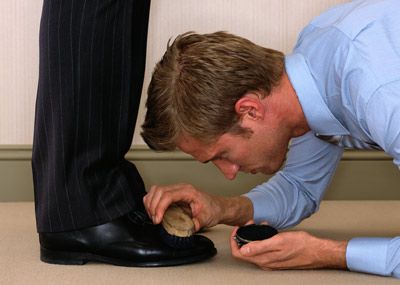Do you whistle while you work, or do you have a case of the Mondays – every day? It's cliché, sure, but for a reason. Compared to people who make their living doing something they'd probably do regardless of a paycheck, many more of us cringe a bit when asked that oh-so familiar ice-breaking question, "So what do you do?"
That cringe, though, isn't necessarily because you're about to admit, say, you have the "worst" job – which happens to be a lumberjack as of 2014; you could spend your days as a lumberjack and enjoy your work more than a mathematician – which happens to be considered the "best" job [source: Perman]. How you, personally, fall along that spectrum of job love and hate is your level of job satisfaction. How content do you feel about your work?
Advertisement
Overall, most of us really don't like our jobs. Our job satisfaction is so low, it turns out – and we're talking about the global workforce, across 90 countries and not just the one you call home – that almost two-thirds of employees report they're completely disengaged from their job, clocking in and out to collect a paycheck. Only 13 percent report they feel emotionally invested in their work [source: Gallup].
Which then brings up the question, exactly how do we know whether we are, in fact, satisfied with our work or whether we're just having a bad day at it? Let's travel back to the '50s.
In the late 1950s, American psychologist Frederick Herzberg asked people to think of a time when they felt good about their job, and why they felt good, followed by a time when they didn't, and what made them feel that way. He theorized from employee answers that our motivation and satisfaction on the job is determined by what he called hygiene and motivators. In this instance, hygiene has nothing to do with your cleanliness. Here, hygiene refers to those intrinsic things that really bug you about your work environment, such as that company vacation policy you happen to disagree with. Motivators, on the other hand, are the extrinsic things about your job that make you feel appreciated and creative, such as growth and advancement. According to Herzberg's motivator-hygiene theory, you can't begin to improve job satisfaction without first addressing those hygiene issues; motivators come second. Basically, your satisfaction won't improve with perks if you don't first enjoy the work you're doing.
Things haven't changed much since then – it turns out Herzberg was pretty spot on – and the way we look at job satisfaction today feels pretty similar to those hygiene and motivator factors; we just don't look at the dimensions of job satisfaction in two categories anymore. To determine an employee's job satisfaction these days, we evaluate how that individual employee perceives several facets of his or her work life. This includes the amount of on-the-job stress, work environment, compensation, perks, communication, recognition, opportunities for growth and advancement, and whether that employee finds any meaning in the work itself.
Advertisement






